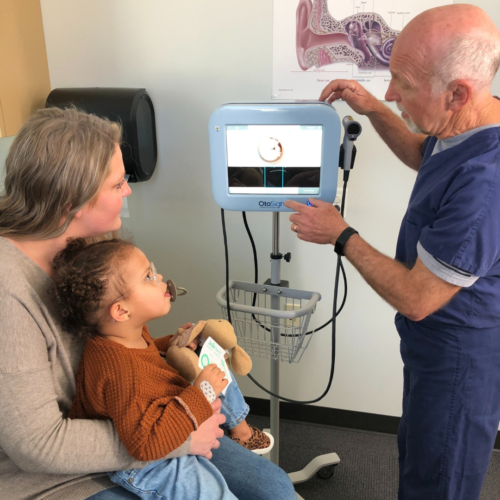Phone
866-411-EARS
Address
PhotoniCare Inc.
2800 Meridian Parkway, Suite 175
Durham, NC 27713

Ear infections are often considered a childhood disease. It almost seems a rite of passage for children to experience repeat ear infections. Then, around the beginning of their teenage years, it often stops entirely. By the time a person hits adulthood, it is quite common to be decades of years removed from the last time he or she experienced an ear infection. It almost seems as though it is impossible for adults to get an ear infection, right? Unfortunately, although not as common in adults as it is in children, it is still possible for adults to suffer an ear infection. In fact, around 20% of ear infections occur in adults. This begs the question, why can adults still get them?
How Adults Get an Ear Infection
Adult ear infections are just like the ear infections a person would have gotten when he or she was a child. Most middle ear infections are caused by either bacteria or viruses. A common cold, the flu, or allergy symptoms that cause congestion and swelling of the nasal passages, throat, and eustachian tubes can sometimes lead to an infection. Anything that makes the nose stuffy has a tendency to cause swelling and blockage of the eustachian tubes. Swelling from colds or allergies can keep the eustachian tubes from opening and this leads to pressure changes and the accumulation of fluid in the middle ear. This pressure and fluid will cause pain and sometimes persistent fluid can lead to an infection.
Adult Ear Infection Risk Factors
Typically, for an adult ear infection, people with a weakened immune system or inflammation in the structures of the ear are more at risk. Adults with diabetes and/or chronic skin conditions (like eczema or psoriasis) also may be more prone to adult ear infections than most.
When to See a Healthcare Provider
One of the hardest questions to answer when it comes to ear infections is if/when to see a doctor. Often, the symptoms of ear infections can go away on their own without the need for antibiotics or a doctor visit. A good warning to remember is if the symptoms of an ear infection have not improved or completely gone away within three days, if there are new symptoms (e.g. fever, loss of balance, etc.), or if there is discharge coming from the ear, then a trip to the doctor’s office should take place. After a doctor has made his or her diagnosis, then treatment can begin, whether with antibiotics or simple pain management.
Ear Infection Prevention
With all infections, there are ways of preventing adult ear infections from happening. Quitting smoking is a massively important step in preventing adult ear infections. Smoking damages the lungs and the respiratory system. It damages the delicate tissues and affects the immune system’s ability to combat respiratory infections, as well as causing inflammation. By cutting out this harmful habit, a person’s body is better equipped to fight infection and prevent an adult ear infection from happening in the first place. In addition to quitting smoking, some basic hygiene tips can also help. Properly cleaning the outer ear after swimming or bathing helps avoid water sitting in the ear, which can lead to outer ear infections. When drying or cleaning the ear, try to avoid using cotton swabs, as use increases your risk of accidentally damaging your eardrum. Finally, regularly washing hands and avoiding allergy triggers as much as possible are good hygiene tips for the ear. Lastly, eating a well-balanced diet is helpful to your whole body, even your ears.
Ear infections are no fun when you’re a kid, and they are no better as an adult. While not as common as childhood ear infections, adult ear infections have a lot of the same symptoms with the potential for more serious consequences if it is allowed to go unchecked for too long. Basic ear hygiene and healthy lifestyle choices are good ways to avoid the infections but may not always be perfect. It’s always good practice to pay attention to your body and not ignore new aches and pains. Just because you are an adult, does not mean you cannot get an ear infection.

The COVID-19 pandemic has created numerous challenges for parents. Navigating… Read More

PhotoniCare sits down with Dr. Michael Novak, an Ear, Nose… Read More

This week on the #EnginEarGuys blog we talk about otolaryngology… Read More